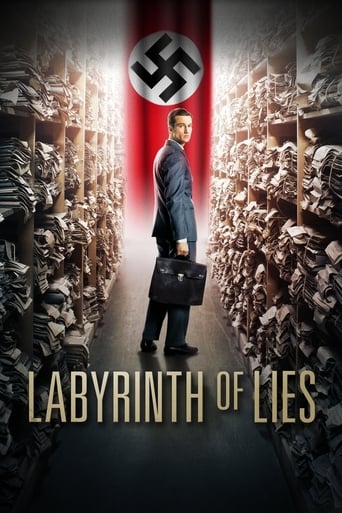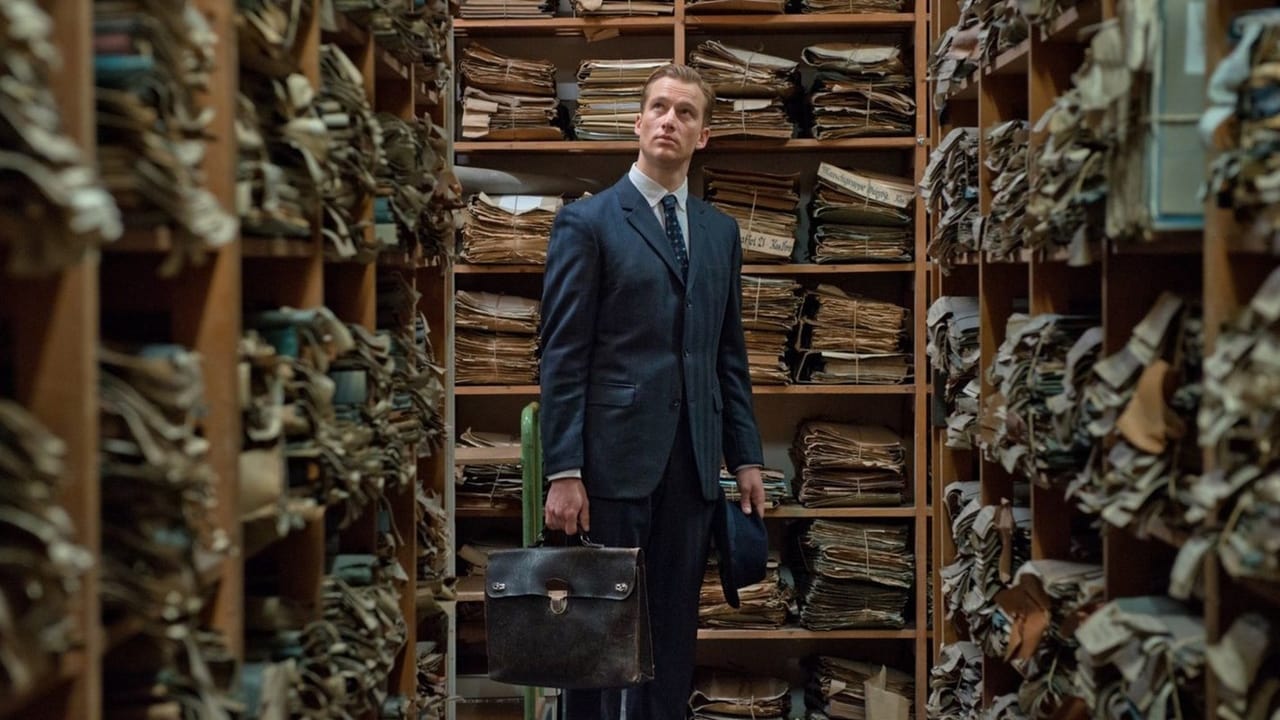Antonia Tejeda Barros
Major Parker (Tim Williams). Originally in German in the movie (the American Major speaks German to Johann Radmann): "You were all Nazis. In the Eastern sector, now you are all communists. Jesus, you Germans! If little green men from Mars landed tomorrow, you would all become green".Finally a movie that shows the culpability of the common German people in the Holocaust! The Holocaust didn't happen just because of 4 Nazi psychos, but thanks to millions of ordinary men (90% of the Germans from 1940-41) who supported the Nazi ideology and happily collaborated in the massacres of millions of innocent men, women and children. By the way, two books that brilliantly demonstrate the collaboration of the vast and overwhelming majority of Germans in the gigantic Nazi killing machine are Rethinking the Holocaust, by Yehuda Bauer (a masterpiece) and Hitler's Willing Executioners: Ordinary Germans and the Holocaust, by Daniel Goldhagen.Im Labyrinth des Schweigens shows the fast oblivion in Germany of the atrocities committed by the Germans just 10 years after the liberation of the Nazi concentration and extermination camps, and the impunity millions of murderers enjoyed, people who tortured, massacred and gassed millions of Jews and non-Jews in the 1940s. Only very few Germans heard about Auschwitz before the famous Eichmann trial in 1961.Im Labyrinth des Schweigens focuses on the the period prior to the trials that took place in Frankfurt between December 20, 1963 and August, 1965 (called in German der Auschwitz- Prozess) against very few SS members who operated in Auschwitz. The trials were ridiculous and a spit on the 1,100,000 victims who were massacred and gassed in Auschwitz. From the 7,000 SS members who operated in Auschwitz during the war, only 22 dogs were judged at the Frankfurt Trials. Nevertheless, the attempt for a pinch of justice was important. From the 22 SS members, only 6 got life imprisonment, many got ridiculous sentences ranging from 3 to 10 years, and 5 were simply released.Im Labyrinth des Schweigens shows the extreme difficulty of judging the murderers because of the silence the Germans kept and their attempt to hide the truth.Im Labyrinth des Schweigens got many prizes (although none were extremely important) and it was the film that Germany presented for the category 'Best Foreign Language Film' (Oscars, 2016), although it was not nominated.I always believed that the only way Germans (and Austrians) have today to clean the blood their parents and grandparents spilled is to be deeply anti-Nazi. But how many Germans and Austrians are there today who are deeply anti-Nazi?"Schweigen" is "silence" in German. The correct translation of the title would be: "In the Labyrinth of Silence". In English the title has been poorly translated as Labyrinth of Lies.The best: the fact that the culpability of the German common pig in the Holocaust finally arouses.The worst: that even when the film shows Fritz Bauer (the judge who made the Frankfurt Trials possible), the character of Johann Radmann (brilliantly performed by Alexander Fehling) is fictitious.
blanche-2
"Labyrinth of Lies" from 2014 is a German film about a young attorney, Johann Radmann (Alexander Fehling) (a combination of three people in reality) in 1958 who decides to go after the bakers, the teachers, the everyday workers who were enforcers of some kind at Auschwitz, a place not many people, including Radmann, had heard of. And when he learns from a friend (Johannes Krisch) who was there how he lost his twin girls (a gutwrenching scene) Johann becomes obsessed with Josef Mengele and is determined to bring him to justice. His mentor and boss, the attorney general Fritz Bauer (a real person) has wanted to do this for years and puts Radmann in charge of the investigation. Bauer is played by the late Gert Voss, who was obviously quite ill when he made this movie. Bauer is a solid presence who knows too well the difficulties his young charge will face and tries to help him.We've seen the basic premise of this film many times- the young, idealistic man taking on the bureaucracy and the stonewallers who insist that they need to "draw the line" regarding the war experience and forget about it. "They were soldiers," "It was war," he is told. But did being soldiers and being at war mean that they treated their prisoners sadistically, starved them, shot them for minor offenses, and herded them into gas chambers?For the young people, underneath it all is a fear as they learn about the atrocities - what was their fathers' involvement in the war? Is it true that nearly everyone was a member of the Nazi Party? Radmann finds this unacceptable, not realizing that being a member of the party in no way meant you accepted their principles, you just didn't have a choice.One interesting aspect of the film was that while some atrocities were described, nothing was shown, and somehow it was all the more devastating. The film had one big problem, and that was the romantic subplot that did not contribute at all to the movie and, in fact, cluttered it.It took the Germans quite a while to accept what happened, although deep down I think many suspected and were uneasy. Radmann believes, "To remain silent is to poison our democracy." I suppose it's a bit like trying to live a normal life after an unacknowledged trauma happens. At some point, one must face it.The acting is emotional and powerful -- Fehling does a nice job of going from an attorney dealing with traffic violations to a passionate man who wants justice. All of the acting is excellent.Someone on this board said that Phoenix was a better film about post-World War II in Germany. It is a better film but quite different from "Labyrinth of Lies." It deals with the immediate aftermath of World War II. It is much more involving - but I give Labyrinth of Lies high marks.
CineMuseFilms
Holocaust stories from Schindler's List (1993) to Son of Saul (2015) penetrate our emotional defences by dragging us right into the horror zone. In Labyrinth of Lies (2014) we are spared this entirely because the horror is of a different kind. The focus is on a nation in denial, desperate to block the collective memories of the generation responsible and prevent the following one from ever knowing. The historical timeframe depicted is critical to grasping the power of this story. Set in 1958 Germany, thirteen years after the war, the economy is booming but the nation's older generation struggle with guilt and anger while the young have not even heard of Auschwitz. Produced in Germany, this film is an illuminating piece of the historical puzzle and part of a nation's prolonged self-atonement.The storyline is linear and uncomplicated. A journalist recognises a former Nazi commander of Auschwitz now working as a schoolteacher, but he cannot elicit any interest from public prosecutors. He befriends young lawyer Johann Radmann who processes parking fines but is desperate to take on serious cases. Despite ridicule from colleagues he is made lead investigator and gradually learns about the secret killing factories of Auschwitz. The labyrinth he encounters is one of silence and lies, as large numbers of public servants and others in positions of power were former members of the Nazi Party and many were morally complicit in Hitler's Final Solution. Along the way, he becomes the obsessive hunter as the investigation keeps getting bigger until it is all- consuming. A romantic sub-story is awkwardly woven into the plot both to humanise Radmann and show the destructive impact that the investigation has on his life. The filming and sets convey the period with authenticity, and the directing is tight although the script is heavy. It takes almost the entire film to expose the full-scale truth, and the results of the investigations are dealt with swiftly as a cinematic necessity.No doubt some people watch Holocaust films for entertainment, but many more do so searching for understanding of this extraordinary period of history. Labyrinth of Lies is important because it fills the gap between war's end in 1945 and the world's slow awakening to what happened at Auschwitz. In particular, it explains how the truth was kept from young Germans oblivious to what their parents did in the war and shows powerful hands on the blanket of silence. Like Spotlight (2015), the story starts by looking at the tip of an iceberg that grew until it overwhelmed a nation and it maintains an engaging thriller quality to the end.
Victoria Weisfeld
Germany's submission (trailer) for Best Foreign Language Film at the upcoming Academy Awards puts viewers in a world of anti-Semitism, fear, denial, indifference and callous pragmatism. The movie, screened with subtitles, breathes life into the familiar storyline of a justice-seeking crusader. This one is not entirely alone, but the pervasive forces he's battling are propagated not just by those in power but by the common folk as well. Set in Frankfurt in 1958, the movie fictionalizes the effort to conduct the first German prosecutions of former Nazi officials. Many believed the Nuremberg trials conducted by the Allied forces had resolved that matter (or should have). At the same time, it was common knowledge that war criminals were everywhere, carrying on normal lives with impunity. Only after these ground-breaking trials did Germans finally confronted their wartime culpability. Bringing ex-Nazis to justice required heroic effort. Making that journey in the film is young prosecutor Johann Radmann, played by Alexander Fehling in a widely praised performance. (Radmann is a composite of several real-life prosecutors.) He's a junior one, handling traffic violations, but he's ambitious. The screenplay deftly reveals this by showing him articulating the case for sentencing a murderer to the maximum penalty of life imprisonment, then we see he's standing alone in front of a bathroom mirror. Into this unfulfilled life comes a revelation from a journalist, Thomas Gnielka (André Szymanski). He tells prosecutors a member of the Waffen S.S. stationed at the Auschwitz concentration camp now works as a school teacher, in violation of federal law. Radmann wants the case, but he's opposed by his boss and colleagues. He's supported, however, then led by a shrewd, experienced Attorney General, Fritz Bauer, the real-life hero of the story, who has long harbored the ambition of bringing top ex-Nazis to justice. Played by the late Gert Voss, he exudes quiet power. Radmann is far less aggressive in his personal life than his professional one, but a convincing romantic involvement with a dressmaker, Marlene Wondrak (Friederike Becht), raises the stakes for him. We feel the horrors of the camp through the emotions of survivors, primarily artist Simon Kirsch (Johannes Krisch), a friend of Gnielka, who lost his twin daughters to the horrific experiments of Dr. Josef Mengele. But the focus stays on the complicity of those who continue to ignore, deny, or cover up Nazi crimes. It's not difficult to understand the disconnect between Radmann and the people trying to thwart him. He was too young to appreciate how so many of his countrymen came to be Nazis. If he can't come to terms with his new knowledge, however, it will destroy him.



 AD
AD



